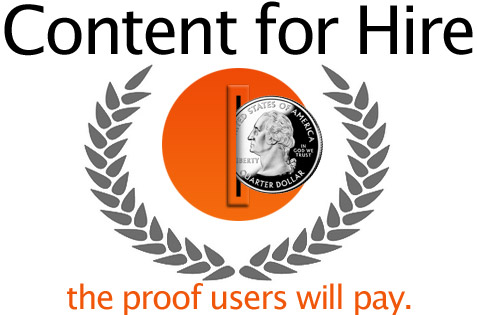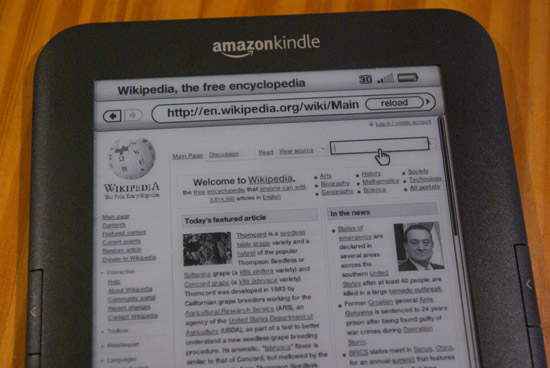
07/29/2011
Gadgets Channel / Bullz-Eye Home
Will people pay for premium digital content? It’s a question that’s as old as the sentiment that the internet will kill the print industry. It became sort of a truism that consumers wouldn’t be willing to pay for content they might have previously been able to get for free online, but it’s hard to tell exactly why. Most studies show that people are more than happy to open their wallets for digital content, and that they have been doing so for years. So why is the pervasive expectation that people will not?
Personally, I attribute it to the wailing and gnashing of teeth on the part of record labels and cinema production houses about their lost revenue. The “war” on piracy suggests that just about anyone with an internet connection is looking for a free meal, but that’s far from the case. At the end of last year, a Pew study concluded that some 65 percent of internet users say they’ve paid for content online. Obviously music and mobile apps were among the top producers, but the products reached as far down the digital food chain as news articles.
Average spending wasn’t particularly low, either. A whopping 32 percent of people polled said they spend more than $30 a month on digital content. That’s a nice chunk of change, even if most of it is going to proven success models like iTunes, Hulu, and Netflix. Most skeptics aren’t worried about music or video, though. They’re worried about text. News articles. Editorials. The kind of stuff people used to buy magazine and journal subscriptions to read. Will anyone be willing to drop real currency on the digitally written word?
 Turns out the answer is a resounding “yes.” Last week, Ars Technica released John Siracusa’s review of Apple’s OS X Lion. Siracusa’s reviews are always comprehensive, which is to say long and exceedingly or excessively thorough. They are intense reads, but they offer an unparalleled look at user interface and operating system design and the reasons behind changes to the system. They are exactly the kind of content people wonder about when they ask, “Will people pay?” Ars Technica made a bid on that question by releasing the 19-page review as an eBook in the Kindle store. The review cost $5, which seems incredibly high to me. Well, it wasn’t too high for the 3,000 people who bought the article in its first 24 hours in the store. Yes, mental math wizards, a review of an operating system pulled in $15,000 in one day.
Turns out the answer is a resounding “yes.” Last week, Ars Technica released John Siracusa’s review of Apple’s OS X Lion. Siracusa’s reviews are always comprehensive, which is to say long and exceedingly or excessively thorough. They are intense reads, but they offer an unparalleled look at user interface and operating system design and the reasons behind changes to the system. They are exactly the kind of content people wonder about when they ask, “Will people pay?” Ars Technica made a bid on that question by releasing the 19-page review as an eBook in the Kindle store. The review cost $5, which seems incredibly high to me. Well, it wasn’t too high for the 3,000 people who bought the article in its first 24 hours in the store. Yes, mental math wizards, a review of an operating system pulled in $15,000 in one day.
It gets better. The review is available for free online. Some 3,000 people paid $5 for something that was available at zero cost. Hell, the Kindle has a web browser. Why not just point the browser to Ars Technica’s site? That $5 would also buy a one month subscription to Ars Technica, granting new members access to Ars articles in several ereader-friendly formats, including PDF. With all these options for getting the article for free or even getting more bang for a five-spot, why were people wiling to drop cash on a free article?
For one, convenience. Though the Kindle has a web browser, it isn’t a good one, and slogging through the ads and different links on Ars Technica with the limited controls of an ereader is less than convenient. A simple purchase and the article is available in an easy-to-read format - complete with Siracusa’s screenshots - and can be bookmarked, saved, and read on other devices.

Users also pay for content that they believe in and are willing to support. As one reader wrote in a review on Amazon’s Kindle Store, “Already read half of this on the Ars Technica web site. Worth buying if only to support John's hard work and time spent to look at the little things.” Quite a sentiment, but this raises some issues with premium content. In the case of Siracusa’s review, the author won’t see a dime of the $15,000 his article made. Ars negotiates a one-time advance for Siracusa, a freelance writer and working programmer. Ars’ founder and editor Ken Fisher assured the Nieman Lab that Siracusa is generously compensated, but as a reader this creates a somewhat disingenuous cycle of support.
This problem will likely become less prevalent as more content providers consider using Ars’ strategy to make some extra cash, but in the meantime, users need to be aware how that $5 fee is being dispersed. I don’t know the contractual details of every book or album I purchase, but I assume that at least some small portion of my cost goes to the artists responsible for the content’s creation. It’s not like Siracusa didn’t get paid - he did, and probably well - but that payment was likely a projection of the review’s value to Ars Technica before the Kindle proceeds, and that kinda sucks.
For now, though, I’m happy to see that people are willing to pay for content they believe in, even if the money isn’t finding its way back to the original authors. Keep an eye out for more stories like Mr. Siracusa’s. You can bet the other content providers around the web are looking at that $15,000 and wondering how to make it theirs. As for the content, make sure you know what you’re buying before you break open that wallet. You might be paying a content provider for a service they’re already providing at no cost.
You can follow us on Twitter and Facebook for content updates. Also, sign up for our email list for weekly updates and check us out on Google+ as well.









